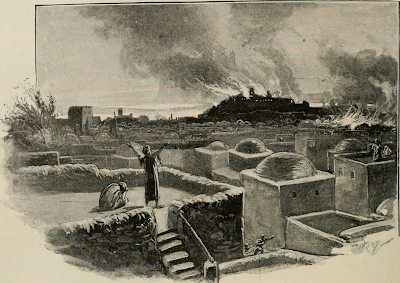Daniel's Powerful Prayer: Daniel 9
Daniel prayed one of the most powerful prayers in the whole Bible. This prayer was so meaningful that he not only received an immediate response from God, God sent an angel with a vision!
Daniel’s deep concern for his people, the realization of their sin, and reverence for God’s reputation incited him to utter the heartfelt prayer we find in Daniel 9.
“While I was speaking, praying, confessing my sin and that of my people Israel, and presenting my petition before Yahweh my God concerning his holy mountain, while I was still praying, Gabriel . . . came to me. . . 'at the beginning of your petitions, an answer went out, and I have come to tell you for you are highly precious. So consider the message and understand the vision.' ” – 9:20-23
Prompted by the Word
“I, Daniel perceived in the books the number of years, that according to the word Yahweh to Jeremiah the prophet, must pass before the end of the desolations of Jerusalem, namely seventy years. . .” – 9:20-23
Confession
“I prayed to Yahweh my God and made confession, saying, 'O Lord, the great and awesome God, who keeps covenant and steadfast love with those who live him and keep his commands, we have sinned and done wrong and acted wickedly and rebelled. . .' ” – 4
The first part of Daniel’s prayer is confession for the sins of all of the Israelites. His confession is not only acknowledgement of the people’s sin, but a proclamation of God’s character.
Proclaiming God's Character
Acknowledging the People's Sin
A Unique Catastrophe
As Daniel proclaims God’s character and acknowledges the people’s failure to heed his word, he draws attention to the “uniqueness” of the catastrophe they have experienced,
“...bringing upon us a great calamity, which under all of heaven there has not been done like in Jerusalem.” – 12
While speaking in hyperbole, Daniel is highlighting how the ransacking of Jerusalem by the Babylonian Empire in 586 BC, which led to the razing of the temple, is unique in its effect upon Israel and upon God’s name (see verse 16 below).
As a bridge to his request of God, Daniel makes a final proclamation about God’s character (and sin acknowledgement) — he is the God who rescued Israel from Egypt and by so doing made a name for himself (Exodus 6:7, 9:16, 14:4).
“And now, O Lord our God, who brought your people out of the land of Egypt with a mighty hand, and have made a name for yourself, as at this day, we have sinned, we have done wickedly.”
Petition
"Do it For You, God"
“O Lord, according to all your righteous acts, let your anger and your wrath turn away from your city Jerusalem, your holy hill, because for our sins, and for the iniquities of our fathers, Jerusalem and your people have become a byword among all who around us." – 16
“For we do not present our pleas before you because of our righteousness, but because of your great mercy… Delay not, for your own sake, O my God, because your city and your people are called by your name.” – 18b, 19b
A Vested Interest in God's Glory
Conclusion/TL; DR
- Scripture should prompt us to confess our sin and petition the Lord in very specific ways
- Daniel received an immediate and elaborate response through an illumination of the Scripture he read
- Confession is not limited to acknowledging our sins, but praising God's character in contrast to our sin
- In Daniel's situation, the sin was especially concerning because God had given them many warnings and yet they failed to repent
- Even when the Israelites failed to repent, God still kept his promise; yet, Daniel still felt the need to pray
- While many other peoples faced Babylon's conquest, Daniel viewed Israel's situation as unique because their status was a reflection of God's glory (at least, in his mind)
- Even though God knew his prayer requests, Daniel earnestly prayed to God and prayed in the most "persuasive" appeal possible—God's concern for himself
- God never "needed" to restore Israel for his reputation to be upheld, but paradoxically took those prayers seriously—was that really for his sake or for the requester's sake?
- Even though Daniel's prayer was God-focused (both his confession and petition), Daniel knew Israel would benefit the most when God's glory was exalted. How true is that for us today!
- One of my favorite biblical motifs! See Exo 32:12, Num 14:12-16, Josh 7:9, 2 Kings 9:19, Jer 14:7, 21; Psa 143:11, Psa 109:21, Psa 25:11, 1 Chr 16:35, etc.
- Eleven imperatives and a second-person jussive in Hebrew



Comments